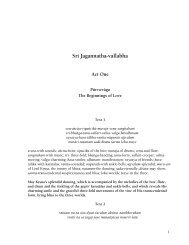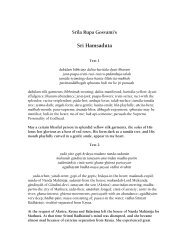Srimad Bhagavatam, Volume 3
Srimad Bhagavatam, Volume 3
Srimad Bhagavatam, Volume 3
Create successful ePaper yourself
Turn your PDF publications into a flip-book with our unique Google optimized e-Paper software.
<strong>Srimad</strong> Bhagawatam, First Canto, <strong>Volume</strong> Three<br />
Her husband also did not ask her to follow him because King Dhritarastra was<br />
at that time fully determined like a great warrior who faces all kinds of<br />
dangers in the battlefield. He had no more any attraction for so called wife or<br />
relatives and he decided to start alone but as a chaste lady Gandhari decided to<br />
follow her husband till the last moment. Maharaj Dhritarastra accepted the<br />
order of vanaprastha life and at this stage the wife is allowed to remain as<br />
Voluntary servitor: but in the Sanyas stage no wife can stay with her former<br />
husband. A Sannyasi is considered to be civil-dead man and therefore the wife<br />
becomes a civil-widow without any connection with her former husband.<br />
Maharaj Dhritarastra did not deny his faithful wife and she followed her<br />
husband at her own risk.<br />
The Sannyasins accept a rod as the sign of renounced order of life. There<br />
are two types of Sannysins. Those who follow the Mayavad Philosophy<br />
headed by Sripad Shankaracharya accept only one rod (Ekadanda) but those<br />
who follow the Vaishnavite Phillosophy accept three combined rods<br />
(Tridanda). The Mayavadi Sanyasins are known as Ekadandi Swami whereas<br />
the Vaishanava Sannyasins are known as Triandi Swami or more distinctly<br />
Tridandi Goswamins in order to keep distinction from the Malavad<br />
philosoply. The Ekadandi Swamis are mostly fond of Himalayas but the<br />
Vaisnava Sainyasins are fond of Vrindaban and Puri. The Vaishnava<br />
Sannyasins are Narottamas whereas the Mayavadi Snanysins are Dheeras.<br />
Maharaj Dhritarastra was advised to follow the Dheeras because at that stage<br />
it was difficult for him to become a Narottama.<br />
Ajata satru krita maitra hutagni<br />
Vipran natwa tilagobhumirukmaih.<br />
Griham pravisto guruvandanaya<br />
Na cha apasyat pitarou soubalin cha.<br />
Ajata--never born, Satru--enemy, Krita--having performed, Maitraworshipping<br />
the demigods, Hutagni--and offering fuel in the fire, Vipran--the<br />
brahmins, Natwa--offering obeisances, Tilagobhumirukmaih--along with<br />
grains, cows, land and gold, Griham--with in the palace, Pravisto--having<br />
entered into, Guruvandanaya--for offering respect to the elderly member, Nadid<br />
not, Cha--also, Apasyat--, Pitarou--his uncle, Soubalin--Gandhari, Chaalso.<br />
Maharaj Yudhtshira whose enemy was neverborn, performed his daily<br />
morning duties by prayers, offering sarificice in tho fire and the Sungod<br />
and offered obeisances to the Brahmins along with grains, cows, land,<br />
gold and then enetered the palace to pay respects to the elderly members<br />
in the palace. He however could not find out his unele and aunt the<br />
daughter of King Subala.<br />
Maharaj Ydhisthir was the most pious king because he practised personally<br />
daily the pious duty for the householders. The householders are required to<br />
rise early in the morning and after cleanliness, should offer respects to the<br />
deities at home by prayers, by offering fuel in the sacred fire, by giving in<br />
charity the Brahmins land, cow, grains and gold etc and at last offering to the<br />
elderly members due respects and obeisances. Unless one is prepared to<br />
practise things which are prescribed in the Shastras no body can be goodman<br />
simply by book knowledge. Modern householders are practised to different<br />
modes of life namely to rise late and then take bed-tea without any sort of<br />
cleanliness and without any purificatory practices as mentioned above. The<br />
householdchldren are taken to practice the samething in which the parents are<br />
already practised and therefore the whole generation is gliding towards hell<br />
and no good things can be expected from them unless they associate with<br />
Sadhus. Like Dhritarastra the materialistic person, one may take lessons from<br />
a Sadhu like Vidura and thus be cleansed of the effects of modern life.<br />
Maharaj Yudhisthir, however, could not find in the palace the two uncles<br />
namely Dhritarastra and Vidura along with Gandhari the daughter of king<br />
Subala. He was anxious to see them and, therefore, asked Sanjaya the private<br />
secretary of Dhritarastra as follows:—<br />
Tatra sanjayam asinam paprachhat udvignamanasah<br />
Gabalgane kva nas tato briddho hinascha netrayoh.<br />
Tatra--there, Sanjayam--unto Sanjaya, Asinam--seated, Paprachhat--enquired<br />
from, Udvignamanasah--full with anxious mind, Gabalgane--the son of<br />
Gabalgan Sanjaya, Kva--where is, Nas--our, Tata--uncle, Briddho--old in age,<br />
Hinascha--as also bereft of, Netrayoh--by the eyes.<br />
Maharaj Yudhisthira full with anxious mind asked Sanjaya who was<br />
sitting on the spot and said "Oh Sanjaya where is our uncle who is<br />
advanced in age and blind by the eyes?"<br />
Amba cha hataputra arta pitribyah kva gatah suhrit<br />
Api mayi akritajne hatabandhuh sa bharyaya<br />
Asamsamanah shamalam gangayam dukshito' apatat<br />
Amba--mother aunt, Cha--and, Hataputra--who had lost all her sons, Artasorry<br />
in plight, Pitribyah--uncle Vidura, Kva--where, Gatah--gone, Suhritwell<br />
wisher, Api--whether, Mayi--unto me, Akritajne--ungrateful,<br />
Hatabandhuh--one who has lost all his sons, Sa--along with , Bharyaya--his<br />
8<br />
wife, Asamsamanah--in doubtful mind, Shamalam--offences, Gangayam--in<br />
the Ganges water, Dukshito--in distressed mind, apatat--fell down.<br />
Where is my well wisher uncle Vidura and mother Gandhari who is too<br />
much afflicted on account of her all sons' demise? My uncle Dhritarastra<br />
was also too much mortified on account of death of all his sons and grand<br />
sons. Undoubtedly I am very much ungrateful: did he therefore, took my<br />
offences very seriously and thus along with his wife has drowned<br />
themselves in the water of the Ganges?<br />
The Pnadavas specially Maharaj Yudhisthira and Arjuna presupposed the<br />
after effects of the battle of Kurukshetra and therefore Arjuna declined to<br />
execute the fighting. The fight was executed by the will of the Lord but the<br />
effects of a family berievement as they thought of it before had come to be<br />
true. Maharaj Yudhisthir was always conscious of the great plight of his uncle<br />
Dhritarastra and aunt Gandhari and therefore he took all possible care of them<br />
in their oldage and berieved condition. When therefore he could not find out<br />
his uncie and aunt in the palace naturally his doubts became more prominent<br />
and conjectured if theyhad not gone down the water of the Ganges. He<br />
thought himself ungrateful because when the Pandavas were fatherless,<br />
Maharaj Dhritarastra gave them all royal facilities to live and in return he had<br />
killed all his sons in the battle of Kurukshetra. As a pious man Maharaj<br />
Yudhisthir took into account all his unavoidable misdeeds and he never<br />
thought of the misdeeds of his uncle and company. Dhritarastra had suffered<br />
the effects of his own misdeeds by the will of the Lord but Maharaj<br />
Yudhisthir was only thinking of his own unavoidable misdeeds. That is the<br />
nature of a good man and devotee of the Lord. A devotee never finds fault<br />
with others but tries to find out his own and thus rectify them as far as<br />
possible.<br />
Pitari uparate pandou sarvan nah suhridah sisun<br />
Arakshatam byasanatah pitribyou kva gatou itah.<br />
Pitari--upon my father, Uparate--falling down, Pandou--Maharaj Pandu,<br />
Sarvan--all, Nah--us, Suhridah--wll wisher, Sisun--small children,<br />
Arakshatam--protected, Byasanatah--from all kinds of dangers, Pitribyouuncles,<br />
Kva--where, Gatou--have, Itah--from this place.<br />
When my father Pandu fell down and we were all small children only at<br />
that time our these two uncles gavs us protection from all kinds of<br />
calamities. They were always our good well wishers, alas where they have<br />
gone out from this place?<br />
Suta uvacha:<br />
Kripaya snehabaiklabyat suto virahakarshitah<br />
Atmeswaram achakshano na pratyahat atipidiah.<br />
Suta uvacha--Suta Goswami said, Kripaya--our of full compassion,<br />
Snehabaiklabyat--Derangement of the mental situation on account of<br />
profound affection, Suto--Sanjaya, Virahakarshitah--distressed of separation,<br />
Atmeswaram--his master, Achakshano--having not seen, Na--did not,<br />
Pratyahat--replied, Atipidiah--being too much aggrieved.<br />
Suta Goswami said. 'Sanjaya having not seen his own Master<br />
Dhritarastra out of full compassion for and derangment of his mental<br />
situation and being too much aggrieved, could not properly reply<br />
Maharaj Yudhisthira.'<br />
Sanjaya was Personal assistant of Maharaj Yudisthira since a very long time<br />
and as such he had the opportunity to study the chequered history of life of<br />
Dhritarastra. And when he saw at last that Dhritarastra had left home without<br />
his knowledge even his sorrows had no bound. He was fully compassionate<br />
with Dhritarastra because in the game of the battle of Kuruksetra King<br />
Dhritarastra had lost everything men and money and at last the King and the<br />
queen had to go away from home in utter frustration. He studied the situation<br />
in his own way because he did not know that inner vision of Dhritarastra was<br />
awakened by Vidura and, therefore, he had left home in enthusiatic<br />
cheerfulness for a better life after departure from the dark well of home.<br />
Unless one is convinced of a better life after renuciation of the present life no<br />
body can stick to the renounced order of life simply by artificial dress or<br />
staying out of home.<br />
Vimrijya ashrvni panibhyam vistabhya atmanam atmana<br />
Ajatsatrum pratyuche prabhoh padou anusmaran.<br />
Vimrijya--smearing on, Ashrvni--tears of the eyes, Panibhyam--by his hands,<br />
Vistabhya--situated, Atmana--by intelligence, Atmanam--the mind,<br />
Ajatsatrum--unto Maharaj Yudhisthir, Ppratyuche--began to reply, Prabho--of<br />
his master, Padou--feet, Anusmaran--thinking after.<br />
Then he slowly pacified his mind by intelligence, smeared over tears of<br />
the eyes by his hands and after thinking of the feet of his Master<br />
Dhritarastra began to reply to Maharaj Yudhisthira.<br />
Sanjaya uvacha:<br />
Na aham veda byavasitam pitror bah kulanandana<br />
Gandharya va mahabaho mushito asmi mahatmabhih.












